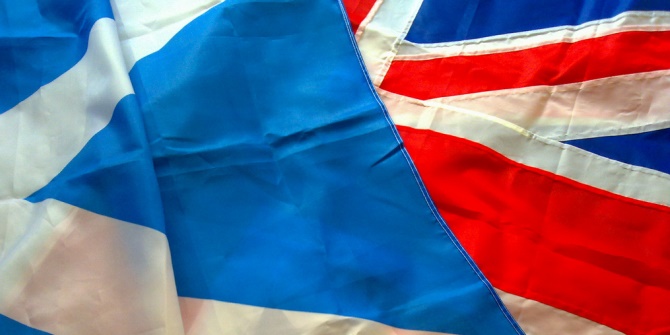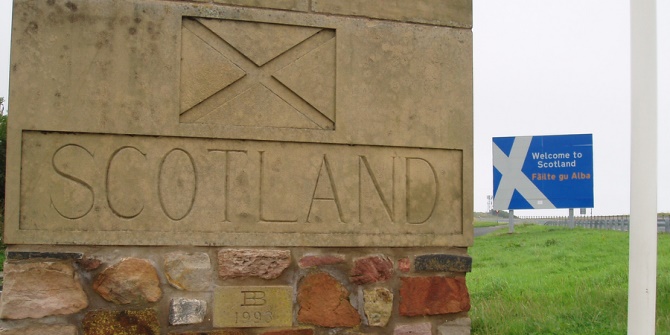 In the fifteen years of devolution a new multi-faith religious establishment has emerged in Scotland in partnership with Scotland’s national Presbyterian Church. The denominations involved are seeking to guarantee that they have a continuing privileged position should Scotland become an independent state. But does religion need any special constitutional recognition and why should it be singled out from the considerable range of other areas of human activity? Written by Norman Bonney.
In the fifteen years of devolution a new multi-faith religious establishment has emerged in Scotland in partnership with Scotland’s national Presbyterian Church. The denominations involved are seeking to guarantee that they have a continuing privileged position should Scotland become an independent state. But does religion need any special constitutional recognition and why should it be singled out from the considerable range of other areas of human activity? Written by Norman Bonney.
In mid-April 2014 the Scottish National Party, which now controls the Scottish Parliament and Scottish Government, celebrated its 80th birthday at its annual spring meeting. It might have been thought that with this long history and its seven years in power as a minority administration 2007-11, and as a majority government since 2011, that it would have presented the Scottish people well in advance with detailed proposals for the features of the independent Scottish state. However, its 649 page November 2013 independence plan, Scotland’s Future, only sketchily does this. It proposes that the Scottish Parliament should take over full sovereign power by March 2016, only a year and a half after the referendum, with a statutory duty to prepare a written constitution for the new state, designed with ‘inclusive’ consultation with the Scottish population. Significant among the many uncertainties as to the character of the future putative independent state facing voters in the referendum is the place of religion in the proposed new constitutional arrangements.
Constitutional concerns of the Church of Scotland
In May 2013 the annual General Assembly of the Church of Scotland, a body that represents, according to the 2011 census, just under one third of Scots, called on the Scottish Government to publish a draft constitution for an independent Scotland ahead of the referendum. It also urged that, in recognition of the historic and continuing role of the Christian faith in Scottish society, any constitutional arrangements must ‘continue to recognise the Claim of Right, … recognise that human realms are under the authority of God, (and) should also recognise the role of religion in general and the Church of Scotland in particular’.
The Claim of Right Act 1689 of the pre–union Scottish Parliament asserted the sovereignty of the Scottish people and legitimated the coming to the throne of Scotland of William and Mary as a result of various constitutional and religious offenses of their predecessor James II who was denounced as a ‘profest papist’ who did not take the oath to maintain the protestant religion in Scotland. The Church is now concerned to protect its special relationship with the monarch, who under the terms of the Acts of Union of 1707 must immediately on coming to the throne, swear to maintain and preserve ‘the True Protestant Religion and the Presbyterian form of church government in Scotland’.
These statements by the Kirk would seem to require a continuation of the Protestant monarchy in an independent Scotland. The brief references in Scotland’s Future contain few explicit references to the status of religion in the new Scotland other than suggesting that there will be no proposed changes to the legal status of any religion. However, there is a suggestion that, while the current form of the monarchy would be retained in the interim, an independent Scottish Government (for which, of course, the current Scottish Government cannot attest) would support reforms to end the current religious discrimination in succession to the throne under the Act of Settlement of 1701 which explicitly excludes Roman Catholics, and others not in communion with the Church of England, from becoming monarch.
There is thus a considerable conflict between the future putative constitution of an independent Scotland and the desire of the Church of Scotland to retain the key current features of the three hundred year old religious settlement. The Scottish Government has avoided potential conflict over these issues by not bringing forward a draft constitution prior to the Kirk’s annual assembly in May 2014, thus depriving the latter’s main deliberative forum of the opportunity to debate the proposed constitution prior to the referendum ballot.
However the Scottish Government has recently decided to bring forward a draft of an interim ‘constitution’ for an independent Scotland in the form of a Scottish Independence Bill which will be revealed in June 2014 on the eve of the Scottish summer holidays and the accompanying July/August recess of the Scottish Parliament. The Kirk and the voters will thus be deprived of adequate opportunities to thoroughly assess these proposals prior to the referendum.
Scotland’s new religious establishment
Seeking to recover some initiative in these debates the Church of Scotland recently convened a meeting of representatives from a wide range of denominations. As well as wanting to preserve its own constitutional advantages the Kirk is also looking to achieve special recognition for religion in general in any new constitutional arrangements. At that meeting it was resolved to hold a further one in July 2014 to review the draft of the interim constitution. The official report of the meeting stated that ‘representatives of Scotland’s diverse faith traditions were united in the view that the contribution of faith to Scottish society should be properly recognised whatever the future holds.’
The bodies represented at this meeting can be described as Scotland’s new religious establishment. Since devolution in 1999 it has evolved out of the requirement to provide regular Church of Scotland, Roman Catholic Church, other Christian, Muslim, Hindu, Jewish and Sikh and some other contributions to the Scottish Parliament’s weekly four minute Time for Reflection. The overwhelming majority of contributions come from these denominations which are members of the Scottish Churches Parliamentary Office and Interfaith Scotland. All these denominations also benefit, directly or indirectly, from funding from the Scottish Government to the interfaith movement, as well as benefits that accrue through charitable status whereby they can avoid tax on income and gains and benefit from gift aid and rates relief. The two main Christian churches also benefit from access to, and influence over, the religious curriculum and worship in state schools and places on council education committees.
A conspiracy against the public?
This multi-faith initiative raises many issues. Does religion need any special constitutional recognition and why should it be singled out from the considerable range of other areas of human activity? In a society where so many are indifferent to religion does the state need to associate with one particular religious denomination or a subset of them? Are not constitutional guarantees of freedom of association and freedom of expression sufficient to protect and empower all citizens as well as those who engage in religious activity? And as Adam Smith wrote:
People of the same trade seldom meet together, even for merriment and diversion, but the conversation ends in a conspiracy against the public, …. But though the law cannot hinder people of the same trade from sometimes assembling together, it ought to do nothing to facilitate such assemblies, much less to render them necessary.
Note: This article gives the views of the author, and not the position of the British Politics and Policy blog, nor of the London School of Economics. Please read our comments policy before posting. Homepage image credit: Charles Clegg CC BY SA-2.0
About the Author
 Norman Bonney is emeritus professor at Edinburgh Napier University. His book, ‘Monarchy, religion and the state; civil religion in the UK, Canada, Australia and the Commonwealth’ is published by Manchester University Press.
Norman Bonney is emeritus professor at Edinburgh Napier University. His book, ‘Monarchy, religion and the state; civil religion in the UK, Canada, Australia and the Commonwealth’ is published by Manchester University Press.








2 Comments